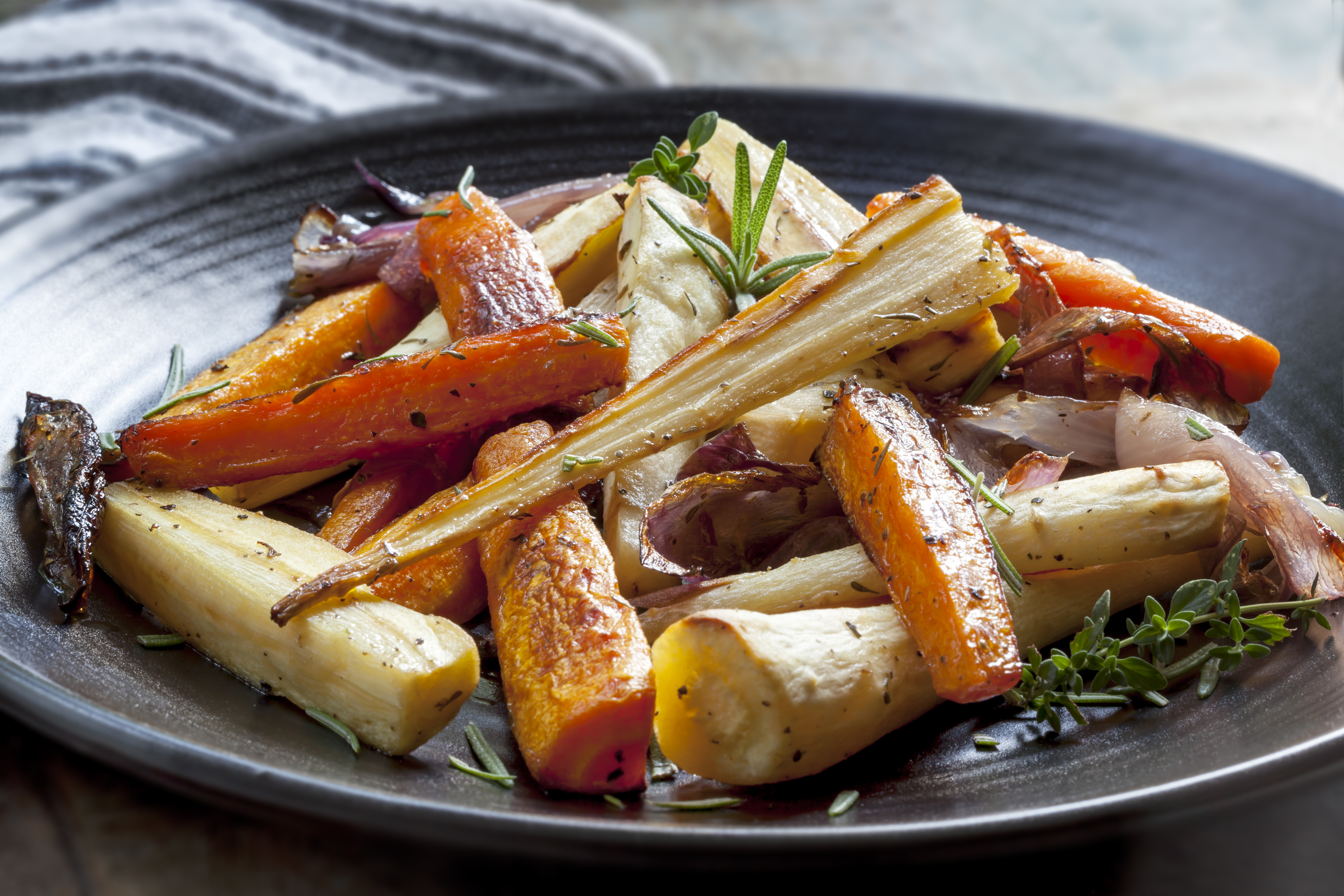
From low fat to high fat, to all diets encourages you to eat vegetables. But what if you hate vegetables?
Let’s be honest, carrots and chocolate cake don’t hit the same sweet spot. However, you still need a way to include more vegetables in your diet and one way to do this is to roast them.
Roasting may be the best way to cook your vegetables. It adds a delicious flavor and a pleasant crunch to any meal.
When roasting your vegetables, there are a couple of ways to go about it. You can do it on the stovetop or in the oven; the oven method seems to be the more popular of the two. There is also low heat roasting and high heat roasting. Either way, you will need to have a good oil on hand for the roasting. Ghee can also be an excellent option for roasting vegetables. However, I will be focusing on which oil is the healthiest for roasting vegetables. With the right oil, you can maintain the healthiness of the vegetables and even add a unique taste to them. Here are a few guidelines to keep in mind when roasting your vegetables.
Good Vs Bad Fat
When roasting vegetables, it is vital to consider the amount of unsaturated and saturated fats as well as essential fatty acids present in the oil. You want to use oils that are low in saturated fats and high in unsaturated fats. This is because saturated fats can increase levels of LDL, which is bad cholesterol and lower HDL levels, which is good cholesterol. You also want to be sure that the oil has a good balance of essential omega-6 and omega-3 fatty acids.
Monounsaturated fats are another crucial factor. Oils low in monounsaturated fat are vulnerable to the oxidation process. This process will produce trans-fat in your oil, which you need to avoid. Depending on whether you are roasting in high temperatures or low temperatures, it can also play a part in what oil you should use. Despite the importance of these factors, the amount of oil that you use will dictate the amount of fat in the meal. With that said, you should try to use the least amount of oil possible for your dishes.
Smoke Point
The smoke point of your oil may be the most crucial factor to consider. If the smoke point of your oil is too low, it is prone to the oxidation process. As said before, oxidation is something that you need to avoid at all costs. You will know your oil is oxidizing when it begins to smoke. This will cause not only trans-fat to develop, but it will change the flavor, color, and smell of the oil.
Most vegetables are roasted at a temperature between 375-450-degrees Fahrenheit. Your oil needs to be above this threshold. If it is not, then it can’t stand the heat and should stay out of the kitchen.
Taste
You should pay close attention to the flavor profile of the oils that you use for roasting vegetables. If you want a unique flavor, then you should consider extra virgin olive oil or coconut oil. If you are not very concerned about the flavor, then grapeseed or canola oils boast a more neutral taste. However, you shouldn’t get too crazy with exotic oils. Although they can be delicious, an oil like avocado oil is too expensive for roasting. Roasted vegetables have a Vegetablesvery bold flavor to them and are likely to overpower the oils. Consider saving your avocado oil for a drizzle finish.
How to Roast
To roast your vegetables, you want to start by cutting your veggies into small-even pieces, then line them up on a baking sheet. Next, you need to drizzle the oil of your choosing on top and add your desired seasoning. Finally, just place them in the oven. You will need to pay attention to the cooking time of each individual vegetable; some will be shorter than others. If this is the case, you may need to take out the baking and sheet a few times to add and subtract certain veggies. You will also need to take the baking sheet out at about half-way to toss the vegetables.
Timetable for Roasting Vegetables
• Asparagus – 20 minutes
• Bell Peppers – 20 minutes
• Cabbage – 30 minutes
• Brussel Sprouts – 25 minutes
• Broccoli – 25 minutes
• Butternut Squash – 30 minutes
• Carrots – 30 minutes
• Green Beans – 20 minutes
• Cauliflower – 25 minutes
• Kale – 15 minutes
• Corn – 40 minutes
• Onions – 35 minutes
• Potatoes – 45 minutes
• Sweet Potatoes – 30 minutes
• Yellow Squash – 20 minutes
• Tomatoes – 15 minutes
• Zucchini – 20 minutes
5 Healthiest Oils for Roasting Vegetables
Extra Virgin Olive Oil
Extra virgin olive oil is a much healthier alternative than all of its counterparts. Its smoke point is on the lower side in comparison to the other grades at only 325-375-degrees Fahrenheit. If you cook it at over 375-degrees, then you will lose its delicate flavors and health benefits. This can make it challenging to use for many kinds of cooking. However, it is high enough to roast vegetables with, in most cases. Extra virgin olive oil is high in monounsaturated fats and helps to prevent heart disease and Type 2 Diabetes. It can also be an excellent finisher to drizzle on your completed dishes. I recommend using for low to mid-temperature roasting to avoid damage to the oil.
Coconut Oil
Coconut oil will add a very unique flavor to your roasted vegetables. It is very stable in high heat situations with a smoke point of 450-degrees Fahrenheit. This means that coconut oil is suitable for both low temperature and high-temperature roasting. Coconut oil is also quite useful for your health. It has been said to help with weight loss, heart health, boost your metabolism, benefit your skin. Coconut oil is high in saturated fat, so I would recommend not overindulging. However, using it in moderation will be beneficial to your health. Coconut oil is a must-have in everybody’s pantry.
Canola Oil
Canola oil is great for those who do not want any additional flavoring to their roasted vegetables. Its taste is neutral, but its benefits are vast. It is easily one of the best oils to roast vegetables with. Canola oil comes from the rapeseed. The oil contains both monounsaturated and polyunsaturated fats. Monounsaturated and polyunsaturated fats are both known to improve cholesterol levels. Canola oil also has one of the least amounts of saturated fat amongst all of the oils. It has a high smoke point of 400-degrees Fahrenheit. This, combined with the monounsaturated fat content, makes it very heat resistant.
Grapeseed Oil
Grapeseed oil is another oil that has a more neutral taste that will not show up in your roasted vegetables. Grapeseed oil is made from the seeds of grapes after they have been pressed. The oil has a high smoke point at 420-degrees Fahrenheit. It is also high in monounsaturated fats, which help to prevent oxidation in high temperatures. Grapeseed oil is excellent for improving cholesterol levels. It boosts your HDL levels and reduces LDL levels. The oil is a good source of essential fatty acids and contains linoleic acid. Linoleic acid is one of the fatty acids that are not produced in our bodies. This means that it needs to be gotten from food, making grapeseed oil very beneficial to our diets.
Safflower Oil
Safflower oil is mainly produced in California and comes from the seeds of safflower. It has a very high smoke point at 510-degrees Fahrenheit. This means that the oil can be used for several kinds of cooking, including roasting vegetables. Safflower oil is low in saturated fats and high in omega-9 fatty acids. Omega-9 fatty acids are known to improve cholesterol by increasing HDL levels and lowering LDL levels. They also rid the body of plaque build-up in the arteries, which largely contributes to heart attacks. Safflower oil has a mild flavor, which will not overpower your roasted vegetables. Roasting with safflower oil is definitely worth a try.
5 Unhealthiest Oils for Roasting Vegetables
Soybean Oil
Soybean oil derives from the seeds of soybeans. The oil has an extremely high smoke point of 450-degrees Fahrenheit. This makes it suitable to cook a variety of dishes with, but I would not advise you to. Soybean oil is highly refined and goes through the bleaching and deodorizing process. This process destroys the health value of the oil. Soybean oil is also very high in polyunsaturated fat. Polyunsaturated fats are not good for high-temperature cooking and make oils vulnerable to the oxidation process. Soybean oil is one of the main oils used in the fast-food industry and has been heavily linked to several health issues. I recommend using it with caution. I would also be careful with oils labeled as just vegetable oil. These oils are made with a variety of different oils. Most of the time a large portion of it is just canola oil in disguise.
Corn Oil
Corn oil derives from the grain of corn. With this said, it is not vegetable oil, which is what many people believe it to be. Corn oils omega-6 fatty acid content are not very balanced. This can cause inflammation, which contributes heavily to heart disease, diabetes, arthritis, and cancer. Corn is also amongst the most genetically modified crops on the market. A majority of the corn out there is genetically modified. So, what does this say about the oil derived from it? However, corn oil does have a decent smoke point of about 440-degrees Fahrenheit for the refined version. This is suitable to roast vegetables with, so use it if you must.
Sunflower Oil
Sunflower oil is typically known as a heart-healthy oil. It has a high smoke point of 450-degrees Fahrenheit in its refined version. However, when used for cooking, many of its healthy components are neutralized. This is because it merely lacks stability in high temperatures. As said before this makes it easily oxidative. Unrefined sunflower oil is even worse for roasting your vegetables. With a smoke point of only 225-degrees Fahrenheit, it couldn’t roast a grape. It is also worth mentioning that sunflower oil is amongst the most carcinogenic of all the oils.
Flaxseed Oil
Flaxseed oil does boast some healthy components to it but should be avoided when cooking. Its smoke point is quite shallow at only 225-degrees Fahrenheit. This is not high enough to roast vegetables. The low smoke point of the oil makes it very toxic when exposed to high heat situations. This again is due to oxidation. Flaxseed oil is best when used for skincare or as an addition to your smoothies.
Hemp Seed Oil
Hemp seed oil has a very low smoke point at 330-degrees Fahrenheit. This is not enough for roasting vegetables, which requires a minimum heat of 375-degrees Fahrenheit. Hemp seed oil is at its best when used as an addition to salads or yogurts and really shouldn’t be used for cooking anything. If used for vegetable roasting, you will lose all of its nutritional value, and it will be vulnerable to oxidation.
Closing Thoughts
Roasting your vegetables is an excellent way to add some flavor to your vegetables and make eating them more enjoyable. If your child doesn’t want to eat their veggies, try roasting them. If you use the right oil, you can’t go wrong. Now, its crunch time!
